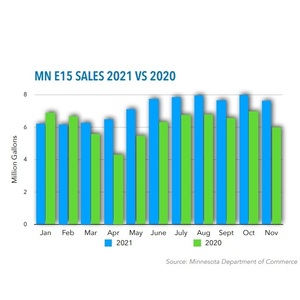MN Bio-Fuels 2021 annual report highlights growth in E15 sales

January 17, 2022
BY Minnesota Bio-Fuels Association
The Minnesota Bio-Fuels Association (MN Bio-Fuels) released its 2021 Annual Report on Jan. 14.
The report details the work carried out by MN Bio-Fuels in the areas of advocacy, communications and fuel supply chain in Minnesota in 2021.
“As 2021 drew to a close, the ethanol industry in Minnesota continued to come back strong from the effects of the Covid-19 pandemic,” said Tim Rudnicki, executive director of MN Bio-Fuels.
Advertisement
This, he said, was illustrated in Minnesota’s E15 sales in 2021.
As of Nov 30, 2021, the volume of E15 sold in Minnesota last year was 78.94 million gallons, exceeding the 74.39 million gallons sold for the whole of 2020.
Going into 2022, Rudnicki said the ethanol industry faces new opportunities for growth while challenges such as a possible summertime restriction on E15 sales remain.
Advertisement
“In 2022, we will have the opportunity to work with our state agency partners to tap into the $100 million in biofuel infrastructure funding grants announced by the USDA,” he said.
Read the MN Bio-Fuels 2021 Annual Report here.
Related Stories
The U.S. Energy Information Administration maintained its forecast for 2025 and 2026 biodiesel, renewable diesel and sustainable aviation fuel (SAF) production in its latest Short-Term Energy Outlook, released July 8.
XCF Global Inc. on July 10 shared its strategic plan to invest close to $1 billion in developing a network of SAF production facilities, expanding its U.S. footprint, and advancing its international growth strategy.
U.S. fuel ethanol capacity fell slightly in April, while biodiesel and renewable diesel capacity held steady, according to data released by the U.S. EIA on June 30. Feedstock consumption was down when compared to the previous month.
XCF Global Inc. on July 8 provided a production update on its flagship New Rise Reno facility, underscoring that the plant has successfully produced SAF, renewable diesel, and renewable naphtha during its initial ramp-up.
The U.S. EPA on July 8 hosted virtual public hearing to gather input on the agency’s recently released proposed rule to set 2026 and 2027 RFS RVOs. Members of the biofuel industry were among those to offer testimony during the event.
Upcoming Events










